Revolutionizing Energy Access: Highlights from Enaccess Abuja's Open Source in Energy Access Symposium
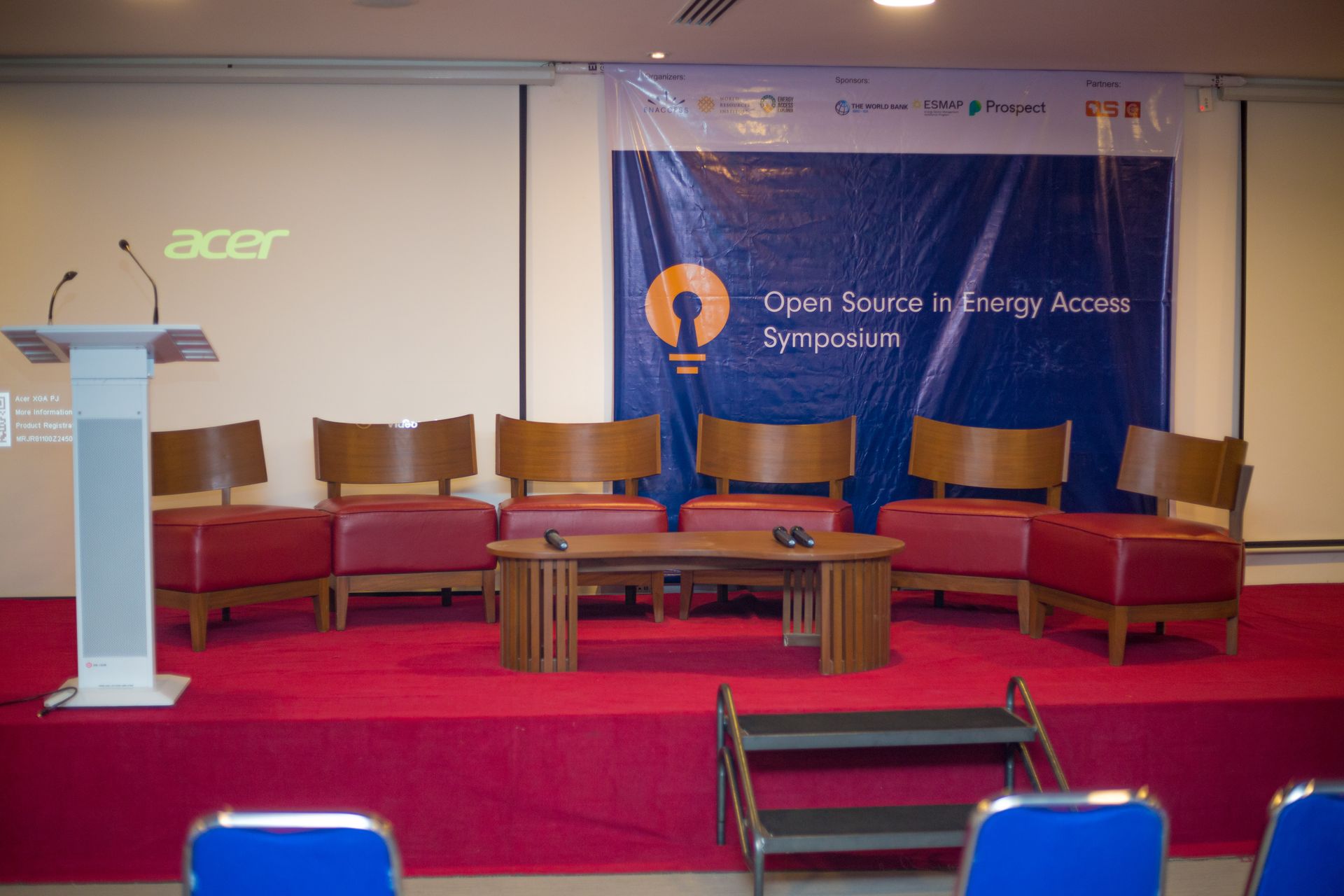
Introduction
The Open Source for Energy Access Symposium was held in Abuja, Nigeria from May 7-10, 2024. This event was jointly orchestrated by EnAccess and the World Resources Institute (WRI), with support from the World Bank. The purpose of the conference was to focus on Open Innovations to optimize industry collaboration, maximize the impact of donor funds, and establish an Open Source sector infrastructure. This initiative aims to foster interoperability, accelerate innovation cycles, and avoid the redundancy of efforts in the energy sector.
I attended the conference as a Cloud Engineer representing the non-profit organization, Energy IoT Open Source. At EnergyIoT Open Source, we combine the best of open source projects in the energy space to provide simple solutions for microgrids. Our work integrates both software and hardware to address common concerns in energy management, protocol management, communication management, and cybersecurity at the grid edge.
Day 1: Opening Day
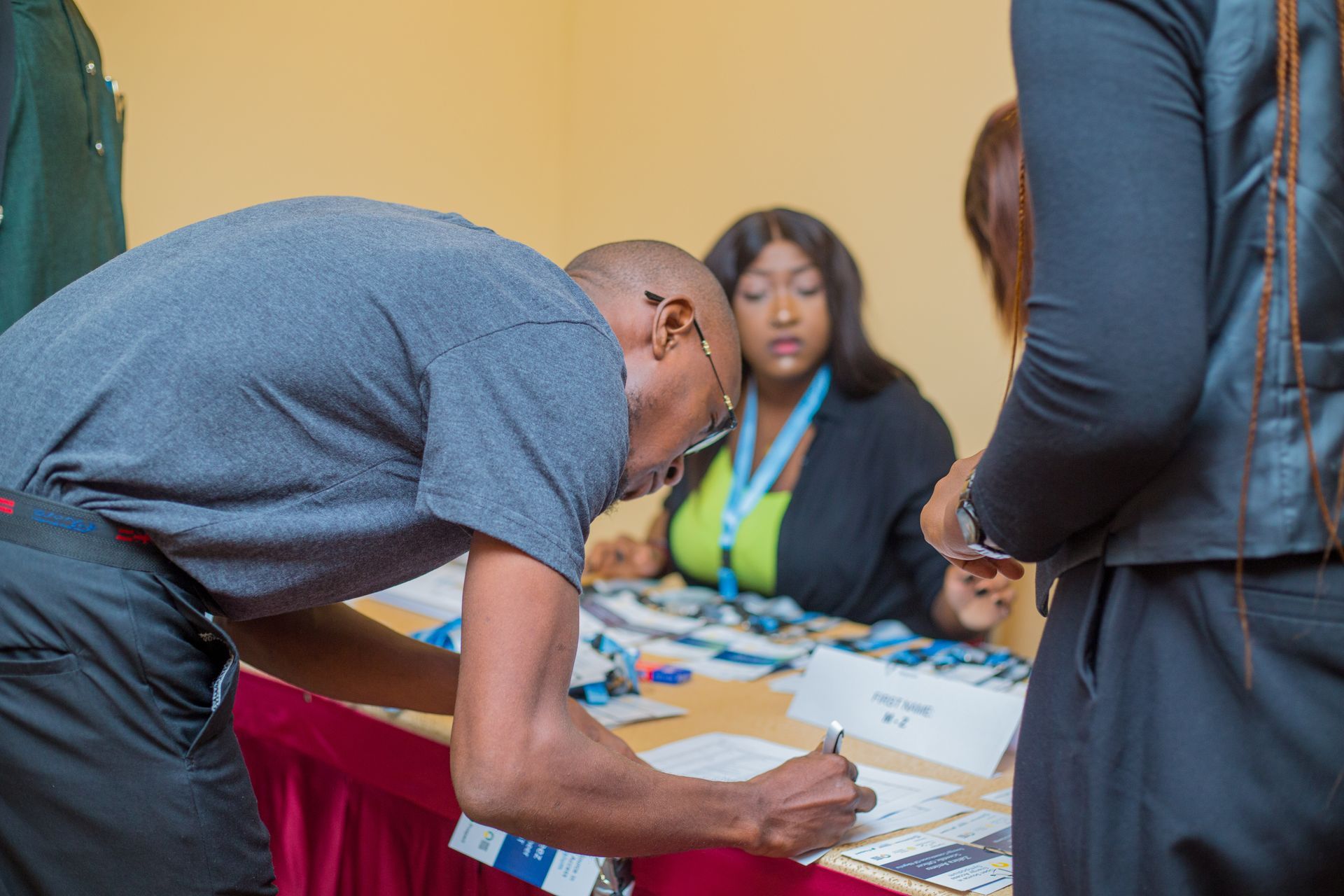
Arrival and Registration
The first day began with registration at 8:20 AM in the Accreditation Hall. Upon registration, I received an EnAccess tag along with some delightful freebies including a tote bag, jotter, and various other useful items.
Opening Ceremony
The Opening Ceremony kicked off at around 9:00 AM with a series of welcome addresses from key figures: Clara Donadello from The EnAccess Foundation, Susan Onyango from the World Resources Institute, and Abba Aliyu from the Rural Electrification Agency. This was followed by an inspiring keynote speech on the potential of Open Source technologies in achieving SDG7, Sustainable Development Goal 7 (SDG7) delivered by Michael Ivenso from the National Council on Climate Change & Global Methane Pledge.
Sustainable Development Goal 7: Affordable and Clean Energy
SDG7 aims to ensure access to affordable, reliable, sustainable, and modern energy for all. It is a critical component of the 2030 Agenda for Sustainable Development, as energy is essential for nearly every major challenge and opportunity the world faces today. From job creation to economic growth, security concerns to environmental challenges, access to energy is central to addressing these issues. The keynote emphasized that leveraging Open Source technologies can play a pivotal role in achieving SDG7 by fostering innovation, reducing costs, and enhancing the scalability of energy solutions. The session ran until 10:40 AM, after which we enjoyed a 20-minute coffee break.
Major Sessions/Workshops
Throughout the day, several key sessions and workshops were held. Here are a few notable ones:
Opportunities and Lessons Learned from Developing and Adopting Open Source Technologies in a Commercial Product (11:00 AM - 11:50 AM, Udeze Hall)
This session featured industry leaders from the African Distributed Renewable Energy (DRE) space sharing their experiences with Open Source solutions. Daniel Komolafe from First Electric, Vaibhav Vaidya from Simusolar, Akeem Azeez from Koolboks, Kanayor Emeagwai from Okra, and Anayo Nas Okenwa from Nayo Tropical Technology Ltd. spoke candidly about the benefits, opportunities, challenges, and lessons learned from integrating Open Source technologies into their businesses. The session was moderated by Vivien Barnier from The EnAccess Foundation and offered a realistic look into the practical challenges of using Open Source in a commercial setting.
Takeaways:
Koolhome by Koolboks: Akeem Azeez highlighted their innovative product, the Koolhome. This solar-powered refrigeration solution generates continuous cooling even in the absence of power and sunlight. Customers can pay in small installments through a Pay-As-You-Go technology, which enables mobile money payments and GSM-based machine-to-machine connectivity to remotely control and monitor the refrigerator’s usage, billing, and performance. This innovation addresses the critical need for affordable and reliable refrigeration in off-grid areas, improving food security and quality of life.
Cicada by Okra Solar: Kanayor Emeagwai discussed the Okra "Cicada" IoT communications module, open-sourced by EnAccess. Cicada is platform-agnostic, compatible with any MCU and even Linux, and supports multiple connectivity options including 2G, 3G, 4G, and WiFi. Its modular design allows it to be integrated with various PCBs, and it supports MQTT for bidirectional communications, optimizing for high latency or unreliable networks. The Cicada library, available on GitHub, exemplifies how Open Source can facilitate remote monitoring and control, essential for effective energy management in remote off-grid villages.
Open Source Geospatial Solutions in Energy Access (11:55 AM - 12:45 PM, Udeze Hall)
This session explored how Open Source geospatial tools can be leveraged to improve energy access. It highlighted the importance of these tools in planning and implementing energy projects, especially in underserved areas.
Tools:
Energy Access Explorer (EAE): This tool stood out during the session for its ability to analyze and visualize data to identify areas with the greatest need for energy access interventions. It integrates various data layers to facilitate decision-making for energy project planning.
Quantum GIS (QGIS): Introduced by the Rural Electrification Agency, QGIS is fine-tuned for local use cases in Nigeria. Developed in collaboration with EAE, QGIS helps in identifying sites for electrification projects using various organizational layers such as agricultural communities, on/off-grid status, transmission lines, population counts, and security concerns.
- Monitoring and Validation: QGIS, along with Google Earth, uses satellite imagery for project verification and location validation, ensuring accuracy throughout the project's lifecycle. This combination of tools enhances the precision and effectiveness of planning and monitoring energy access projects
.
Open Source for Climate Finance and Monitoring, Reporting, and Verification (1:45 PM - 2:30 PM, Udeze Hall)
This discussion focused on the role of Open Source technologies in climate finance and the transparency of monitoring, reporting, and verification processes. It provided a historical overview of how collaboration and Open Source technologies have driven advancements in this field.
For more detailed information on the sessions from Day 1, you can visit the Open Source for Energy Access Symposium schedule
Impactful Session
One of the most impactful sessions for me was on FAIR Batteries. Dr. Peter Ngene, an Assistant Professor at the Debye Institute for Nanomaterials Science - Utrecht University, discussed the development of affordable and easy-to-use redox flow battery technologies suitable for small mini-grids in rural areas. The FAIR battery project aims to make the knowledge of battery assembly and operation Open Source to facilitate the energy transition in poorer rural areas.
Personal Reflections
The first day of the conference was immensely informative and inspiring. The keynote speech set an optimistic tone for the potential of Open Source technologies in achieving sustainable development goals. The sessions throughout the day provided valuable insights into the real-world applications and challenges of adopting Open Source solutions in the energy sector. Networking with other professionals and hearing their experiences further reinforced the importance of collaboration and innovation in driving progress.
Day 2: Demonstrations and Breakout Sessions
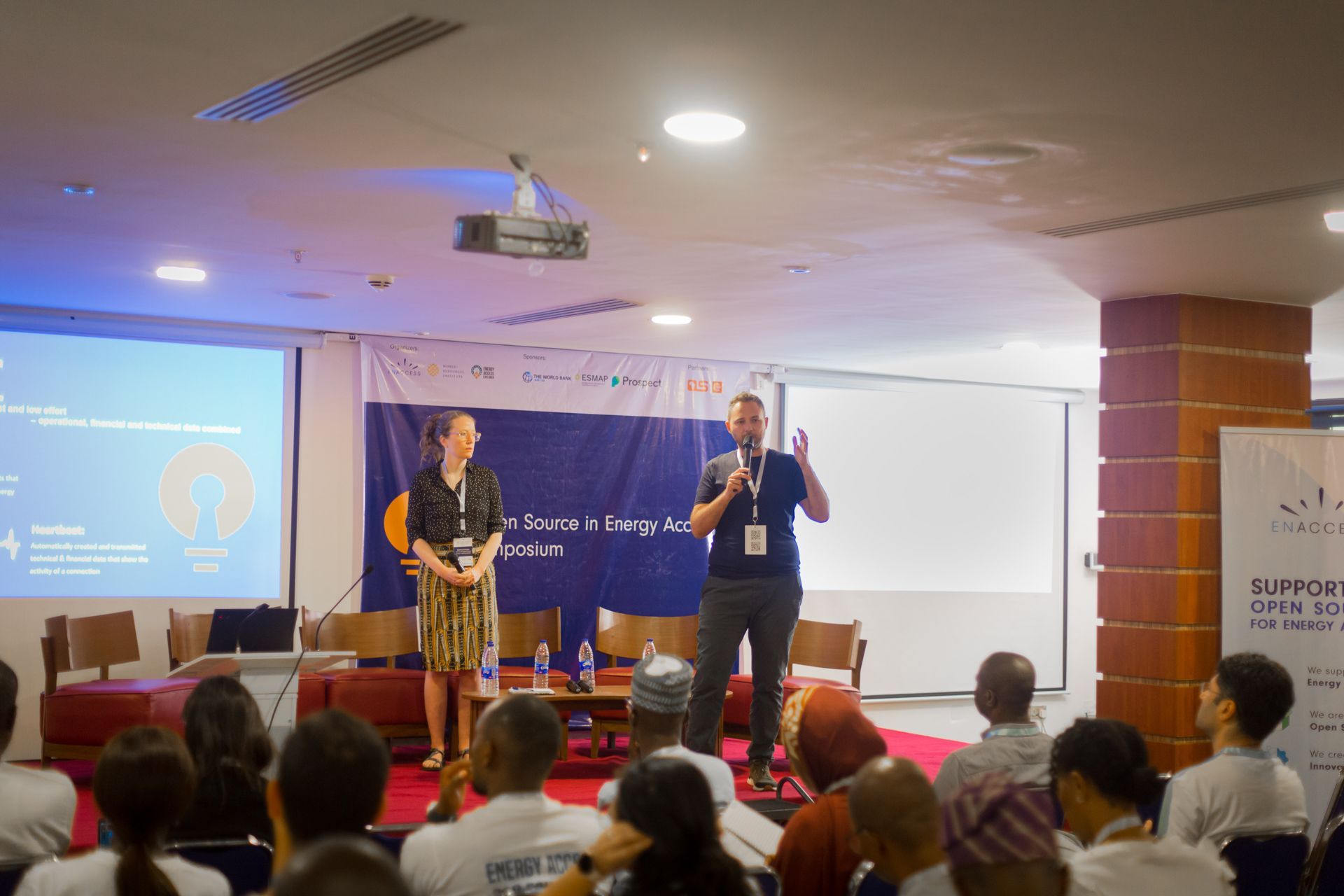
Arrival and Registration
Day 2 started similarly to Day 1, with arrival and registration, followed by opening remarks and a recap of the first day's highlights.
Demonstration of Open Source Technologies
The morning was dedicated to demonstrating various open source software in the energy space:
Energy Access Explorer: The Digital Public Good to Deliver Climate-Friendly and Viable Energy Transitions (9:30 AM - 10:30 AM, Udeze Hall)
Presented by Dimitris Mentis, Akasha Saklani, and Douglas Ronoh from the World Resources Institute, this session introduced the Energy Access Explorer (EAE). EAE is the first open source, data-driven, integrated, and inclusive approach to energy planning, helping stakeholders identify high-priority areas for energy access interventions. It functions as a dynamic information system, reducing software engineering and data transaction costs for both data providers and users, and facilitating data management and governance.
Prospect (10:35 AM - 11:20 AM, Udeze Hall)
Presented by Brianna Schuyler from the Access to Energy Institute and Razvan Sandru from GIZ GET.invest, this session covered Prospect, an open-source platform that automatically collects, harmonizes, aggregates, analyzes, and displays data from modern, sustainable energy solutions. It enables companies to securely share data, gain insights, and aid in financing; allows subsidy programs or investors to access verified results; and helps governments track the real-time state of electrification.
Offgridplanner.org (11:25 AM - 12:10 PM, Udeze Hall)
Presented by Gregory Ireland from the Reiner Lemoine Institut, this session introduced Offgridplanner.org, a free online tool for planning off-grid systems in Nigeria. The tool simulates and optimizes off-grid electricity supply systems using the open energy modeling framework and offers a unique distribution grid layout design feature. It is aimed at project developers, government institutions, researchers, and energy access practitioners.
For more detailed information on these and other sessions, you can visit the
Open Source for Energy Access Symposium schedule.
Breakout Sessions
After the demonstrations, I participated in a breakout session themed "Presentation of Breakout Sessions and Working Group Topics":
Presentation of Breakout Sessions and Working Group Topics (12:15 PM - 12:45 PM, Udeze Hall):
A. Open Source in Energy Access and Collaborators Community
Discussed the missing building blocks and ways to improve collaboration.
Moderator: Vivien Barnier, The EnAccess Foundation
B. Funding/Investment Strategies
Explored how funders/investors can benefit from collaboration and interoperability and promote/facilitate Open Source approaches.
Moderator: Chibuikem Agbaegbu, Climate and Energy Specialist
C. Data Management, Governance, Security, and Open Data Standards for Energy Access Projects
Delved into the needed data management infrastructure, roles, and responsibilities of data providers, and the potential for sector standards.
Moderator: Dimitris, World Resources Institute
D. Drawing the Line Between Open Source and IP
Explored the balance between Open Source and Intellectual Property rights, and how to leverage both for innovation and competitiveness.
Moderator: Princess Odiaka, Trifinity Intelligence Consult Ltd.
I was part of Group B, where we discussed funding and investment strategies, particularly how funders and investors can benefit from and promote Open Source approaches.
Closing Ceremony
The day concluded with a closing ceremony:
Presentation and Q&A on Breakout Sessions Outcomes (4:10 PM - 5:00 PM, Udeze Hall)
Recap of Symposium Highlights
Closing Remarks and Next Steps
Group Picture
Personal Reflections
Day 2 was rich with practical demonstrations of Open Source technologies that have significant potential to transform the energy sector. The breakout sessions facilitated deep discussions on critical topics, particularly funding and investment strategies in my group. The closing ceremony was a fitting end to a day filled with learning and collaboration, setting a positive tone for the remainder of the symposium.
Breakout Session Group
Day 3: Hackathon and Ideation
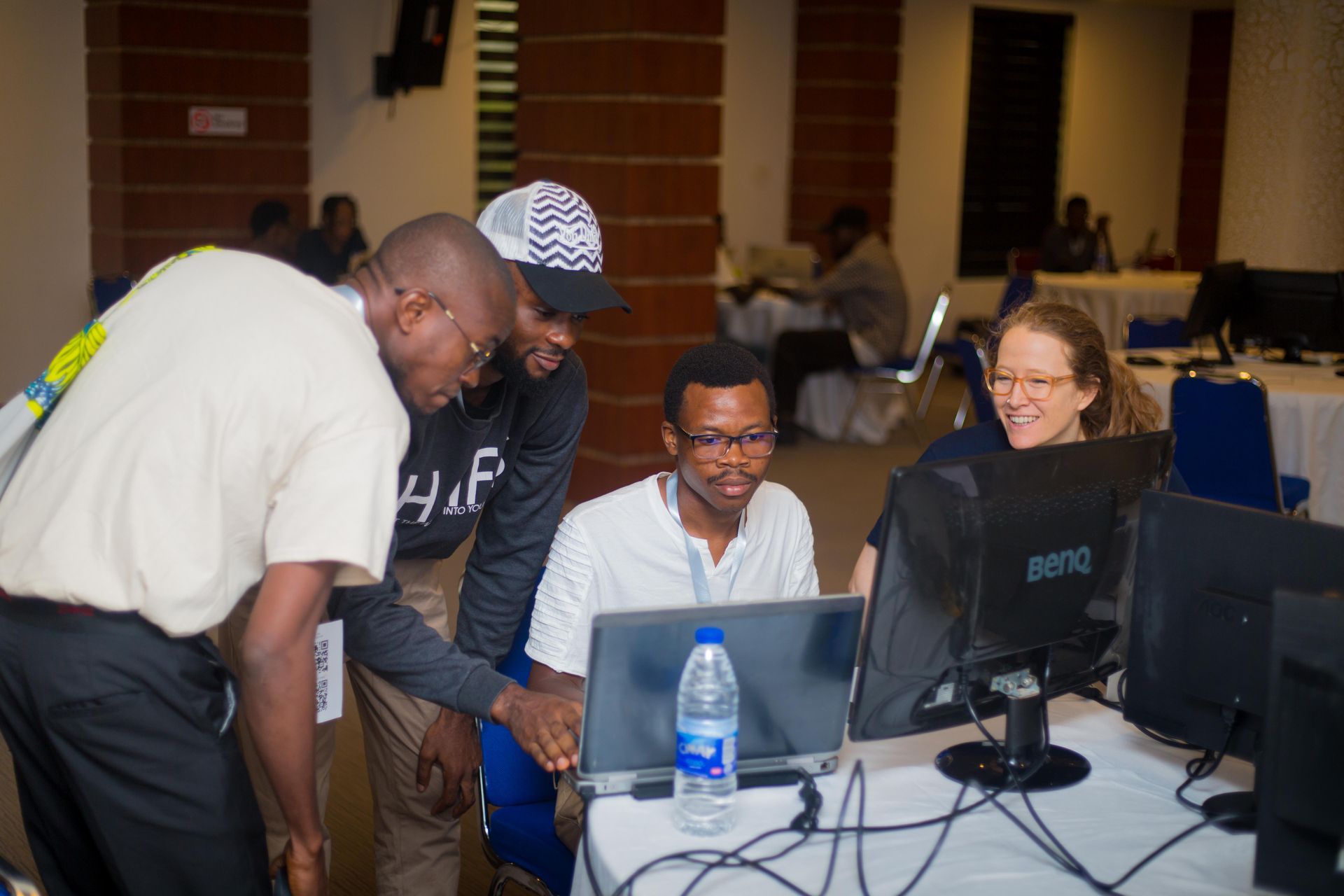
Arrival and Registration
Day 3 began similarly to the previous days, followed by the presentation of challenges for the day. This day was dedicated to a hackathon and ideation sessions aimed at tackling specific projects.
Presentation of Challenges
The challenges presented included:
Ideation Challenge: Collaboration Roadmap for Open Source Geospatial Solutions in the Energy Access Space
The goal of this challenge was to develop a collaboration roadmap to facilitate knowledge exchange and collaboration among open source practitioners. This roadmap aimed to maximize the efficiency and adoption of geospatial solutions where they are needed the most.
Hackathon – Validation Algorithm of Energy Production Data
The objective of this challenge was to focus on data validation, which is developing a machine-learning model to differentiate between energy data originating from the grid and those from a generator. This distinction is crucial for accurate energy planning. Their model, trained on features like current, voltage, and frequency, achieved an impressive 80% accuracy in identifying data sources.
Hackathon Challenge: Open Hardware Template Repository
This project aimed to create a KiCAD template repository with features like automatic diff generation for PCBs and schematics, release management using GitHub tags, and a workflow to update and deploy production files.
Hackathon Challenge: Port OpenPAYGO Python Library to Other Languages (JS, PHP)
The goal was to make the OpenPAYGO functionality available in other programming languages such as JavaScript and PHP. The primary focus was on the Token feature of the OpenPAYGO ecosystem.
Initiated Projects
Due to the contributions and presence of hackathon participants, three projects were initiated:
- Ideation Challenge: Collaboration Roadmap for Open Source Geospatial Solutions in the Energy Access Space
- Hackathon – Validation Algorithm of Energy Production Data
- Hackathon Challenge: Port OpenPAYGO Python Library to Other Languages (JS, PHP)
Participation in Validation Algorithm of Energy Production Data
I was part of the team working on the Validation Algorithm of Energy Production Data. My role involved setting up Docker and other dependencies to create an environment conducive to analysis and development. This setup was crucial for enabling the integration of the Prospect Platform with MPM, allowing users to take full advantage of Prospect's capabilities without needing manual steps.
Personal Reflections
Day 3 was highly engaging and collaborative. The hackathon environment fostered creativity and teamwork, as participants worked on innovative solutions to real-world challenges.
The team I worked with included remarkable individuals like Brianncaa Schuyler, Director of Digital Product at Access to Energy Institute, and Akeem Azeez, R&D/IoT Engineer at Koolboks. Brianna and Akeem focused on the data analysis and validation of a local subset of remote locations in Nigeria, bringing their expertise in digital products and IoT to ensure the accuracy and relevance of the data.
Meanwhile, I was part of the team working on the Validation Algorithm of Energy Production Data challenge. My role involved setting up Docker and other dependencies to create an environment conducive to analysis and development. This setup was crucial for enabling the integration of the Validation Algorithm, allowing users to take full advantage of capabilities without needing manual steps.
Working alongside Brianna and Akeem was an enriching experience. Their insights into the local energy landscape and technical expertise greatly complemented our collective efforts. We collaborated seamlessly, combining our skills and knowledge to develop robust solutions. The synergy within our team not only enhanced the project's outcomes but also reinforced the importance of interdisciplinary collaboration in tackling complex energy challenges.
Being part of the Validation Algorithm of Energy Production Data project allowed me to contribute directly to the development of tools that can significantly enhance energy planning and management. This experience was a testament to the power of teamwork and innovation in driving sustainable energy solutions.
Day 4: Hackathon and Ideation - Day 2
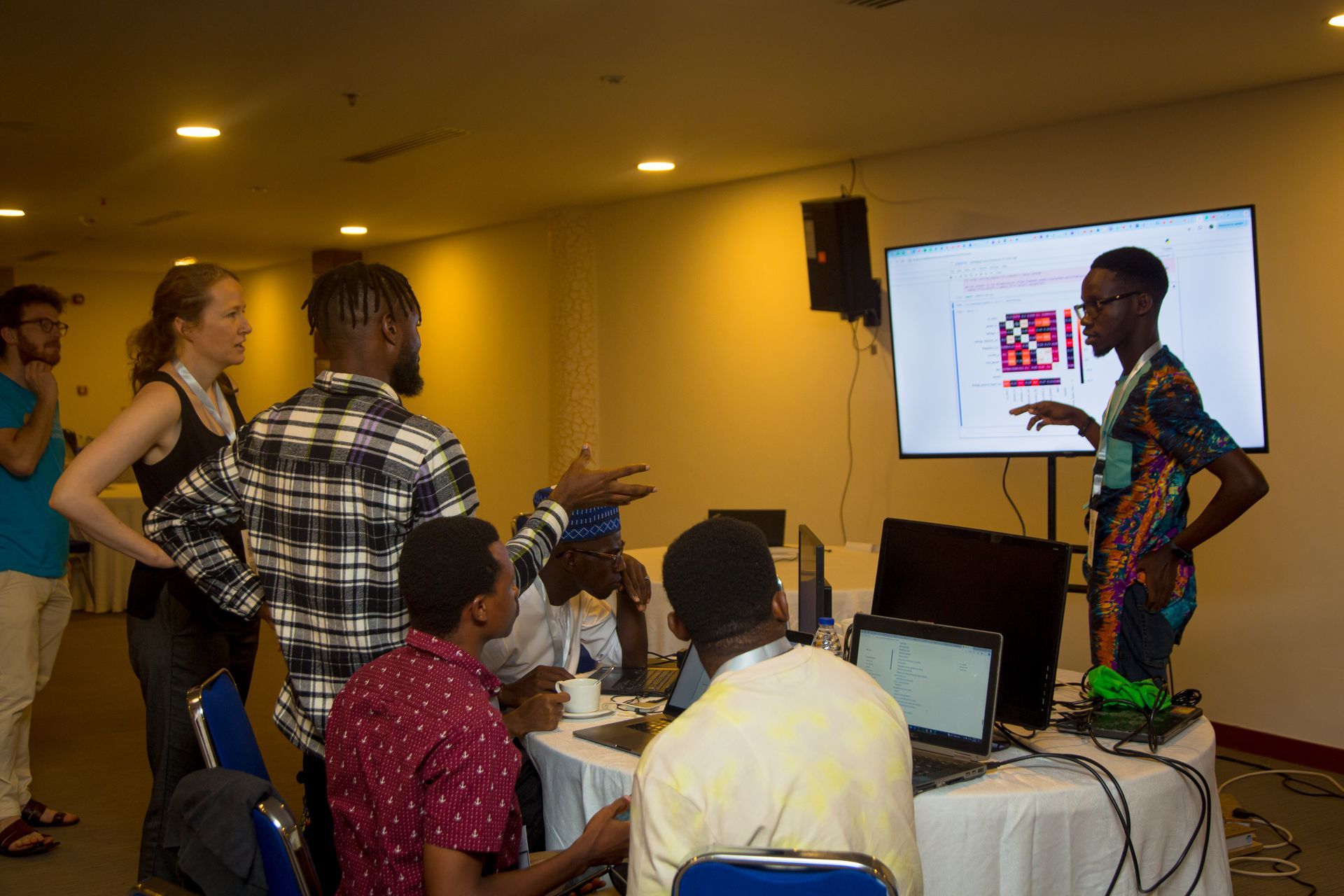
The final day started with arrival and registration from 8:20 to 9:00 AM in the Accreditation Hall.
Morning Sessions
Recap of Day 1 Hackathon and Ideation (9:00 AM - 9:30 AM, Udeze Hall)
The day began with a recap of the first day of the hackathon and ideation sessions, highlighting progress made and setting the stage for the final day of work.
Feedback and Re-prioritization
Teams provided feedback and adjusted their priorities based on their progress and any challenges faced. This session ensured everyone was aligned and ready to make the most of the final day.
Working in Teams
From 9:45 AM to 12:30 PM, teams continued their work in both Udeze Hall and Louisa Hall. This extended work period allowed teams to dive deep into their projects, focusing on development, testing, and preparation for final presentations.
Lunch Break
Lunch was provided by the symposium from 12:30 PM to 1:30 PM. Coffee, tea, and snacks were available throughout the day to keep participants energized.
Afternoon Sessions
Continued Team Work (1:30 PM - 4:30 PM, Udeze Hall & Louisa Hall)
Teams resumed their work in the afternoon, making final adjustments and preparing for their presentations.
Final Presentations and Awards
Each team presented the outcomes of their projects, showcasing the progress made during the hackathon and ideation sessions. This was an opportunity to highlight innovative solutions and share insights gained.
Awards and Closing
The symposium concluded with an awards ceremony, recognizing standout projects and contributions. Closing remarks reflected on the symposium's achievements and set the tone for future collaboration and innovation in the open source energy space.
Personal Reflections
Day 4 was a culmination of intense collaboration and innovation. The focused work periods allowed teams to make significant progress, and the final presentations were a testament to the power of open source solutions in the energy sector. The awards ceremony provided a celebratory end to an inspiring symposium, leaving participants motivated to continue their work in advancing energy access through open source technologies.
Personal Experience and Insights
As a Cloud Engineer representing EnergyIoT, I had the privilege of participating in this symposium and engaging with thought leaders and innovators. The sessions provided deep insights into how open source technologies can optimize industry collaboration, maximize the impact of donor funds, and establish robust sector infrastructure. From the opening ceremony, where we explored the potential of open source to achieve Sustainable Development Goal 7 (SDG7), to the detailed technical sessions and collaborative hackathons, each day was filled with valuable learning and networking opportunities.
On a personal level, the symposium resonated deeply with me as I have witnessed firsthand the energy challenges faced by my community back home in Nigeria. Access to reliable and affordable energy remains a critical issue, and the discussions around innovative solutions inspired me to envision a brighter energy future for Nigeria. The community-focused projects and success stories shared during the sessions highlighted the transformative power of technology and collaboration, reinforcing my commitment to leveraging my skills to drive positive change.
What truly inspired me was the potential of these advancements to bridge the energy gap in Nigeria. The ideas and strategies discussed provided a roadmap for harnessing open source solutions to not only improve energy access but also foster economic growth and development. This experience has galvanized my passion for contributing to the future of energy in Nigeria, where sustainable and inclusive energy solutions can uplift communities and empower individuals.
Highlights and Key Takeaways
Day 1 set the tone with impactful keynote addresses and discussions on the benefits and challenges of adopting open source technologies in commercial products. The sessions highlighted the real-world applications and potential of these technologies to drive innovation and efficiency.
Day 2 was dedicated to demonstrations of cutting-edge open source tools and platforms like Energy Access Explorer, Prospect, and Offgridplanner.org. These sessions showcased practical solutions that can significantly enhance energy planning and access, particularly in underserved regions.
Day 3 and Day 4 were focused on hackathon and ideation activities. Participants worked collaboratively on various projects, including the development of a collaboration roadmap for geospatial solutions, the integration of Prospect with MPM, and the porting of the OpenPAYGO Python library to other programming languages. These hands-on sessions underscored the importance of practical implementation and the collaborative spirit of the open source community.
Future Prospects and Closing Thoughts
The symposium concluded with final presentations and an awards ceremony that recognized outstanding contributions and innovative solutions. The collaborative efforts and shared knowledge from this event are expected to drive significant advancements in energy access and management.
The Open Source for Energy Access Symposium was a resounding success, fostering a spirit of collaboration and innovation. It reinforced the critical role of open source solutions in addressing global energy challenges and highlighted the collective efforts needed to drive sustainable development. As we move forward, the insights and connections gained from this symposium will undoubtedly play a crucial role in our ongoing efforts to enhance energy access and sustainability.
Conclusion
The Open Source for Energy Access Symposium held in Abuja, Nigeria, from May 7-10, 2024, was an inspiring and highly productive event. Jointly orchestrated by EnAccess and the World Resources Institute (WRI) and supported by the World Bank, the symposium gathered industry leaders, innovators, and stakeholders to explore the transformative potential of open source solutions in the energy sector.



